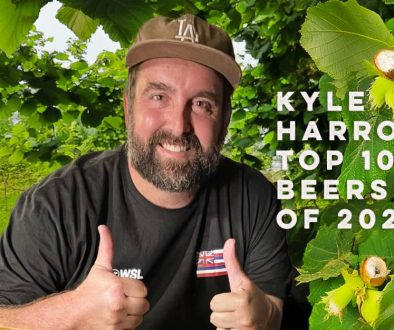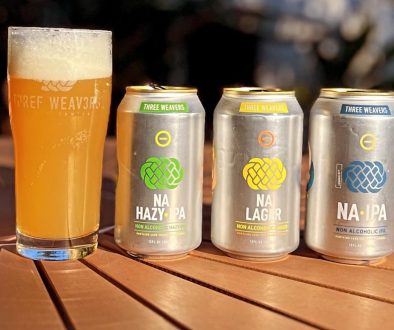Anthony Bourdain: Sharing the World
I’ve worked in the beer business since the summer of 2001. Starting at the bottom, merchandising grocery loads, I eventually earned a series of promotions that lead me to the on-premise beer sales team serving bars, restaurants, taverns, and any place you could drink a beer onsite in Portland, Oregon. At some point, early in my career, an industry friend handed me a book saying that if I was going to work with restaurants and chefs, I needed to know who they were and why they did what they did. It was Anthony Bourdain’s “Kitchen Confidential.”

Portland is bastion of independent restaurants and chef culture. Bourdain’s autobiographical tour of his early career in kitchens and the characters he worked with shaped and formed my approach to my work and my passion for beer. It made me feel more comfortable in my skin as a nerdy young guy exploring the world of craft and imported beer surrounded by dudes in polo shirts slinging Coors Light. He helped me, a misfit like so many he described in his book, find my place in the world.
As I explored the panoply of beer, not just local beer coming out on the tail of last major crash in the craft beer market, but the entire globe’s beer; books like Garrett Oliver’s “Brewmaster’s Table” built on the joy of food, beer, and culture that “Kitchen Confidential” laid as the foundation. They also kindled my love of travel.
Bourdain’s singular gift was his ability to meet food and drink culture head on in a place of profound respect and joy. He traveled the world sharing the culture of the table with his audiences. The food and beverages we drink are so fundamentally tied into the context of the culture of the world’s people and places that there’s no better way to immerse yourself in someone else’s life. Bourdain did it with kindness and respect and with the goal of breaking down the barriers that separate us.
I have traveled to some of the most amazing places in Europe in search of beer, but the most memorable and fulfilling of my memories aren’t sipping from a taster in a “craft beer bar.” The best memories are immersing myself in the local culture and listening to those who live it. Getting a tour from a Trappist monk at Rocherfort and witnessing his joy for his calling and for the beer that helped sustain the abbey and its residents. Talking Lambic and Geuze history and culture with Frank Boon while he pours lambic from a 100+ year-old foeder. Sitting in a little neighborhood bar in Florenville, Belgium drinking Orval and blending in until I’d exhausted my French and became the curiosity of everyone sitting along the bar with me. Getting invited to a lock-in down the street because someone at the previous bar wanted to share his friend’s bar with me. All of those experiences with food and beer came because a friend made the timely gift of Anthony Bourdain’s book. That book kindled an ember that I’ve stoked into my life’s passion.
Today, in Strasbourg, France, Anthony Bourdain’s body was found. Depression beat him. It’s times like this that we talk about mental health and mental illness. Depression is a disease, like cancer or any other medical condition. It’s not weakness or selfishness. It’s a disease that needs to be talked about like any other disease. You fight cancer. You fight depression. And in spite of everything you do, sometimes the cancer wins. Today, depression won.
Many mentally ill people seek help, but sometimes it’s not enough. Many people with mental illness don’t seek help out of fear from the stigma we as a society attach to mental health issues that we don’t attach to other illnesses of the body. Or sometimes the disease tells you not to seek help because no one cares. The disease lies to you. The brain is part of the body, and sometimes it doesn’t work right through no fault of the person whose body that brain resides in.
We as a society need to reframe how we talk and deal with mental illness. It’s something all of us can do. We can reframe how we talk about it. We can stop using “crazy,” or “schizo,” or “OCD, or “insane” as pejoratives. We can stop belittling, even unintentionally or casually, people with mental health issues. You don’t belittle a person with cancer or rheumatoid arthritis. People with mental illness need friendship and support and treatment. They don’t need to be stigmatized or ostracized from society. All humans need compassion and love. That’s the least we can do, even though in rough times like these, it seems so very hard.
If you suffer from mental illness, remember your community and reach out for help. We love you and want to be here for you. If you live with or love someone with mental illness, take time to take care of yourself for when you’re needed. If you suspect someone you love is suffering, reach out to them even if it feels intrusive. If you suspect someone is a victim of depression, realize their depression may be incapacitating them or lying to them and preventing them from asking for help.
Try to live a little like Anthony Bourdain did: with kindness and joie de vivre. Embrace each other, enjoy the small pleasures of food and drink, and try to think from another’s point of view and find that empathy that connects us to our fellow humans and our global community. Bourdain reached out to people around the world on their level and with genuine interest in their world and in response, they opened up to him. We got a brief vicarious look into someone else’s life, culture, and small joys through food and drink through Anthony Bourdain.
Today, people are sharing the memories of their interactions with Anthony Bourdain and the kind of person he was–someone who would always make you feel welcome, like he was a friend you just hadn’t had a chance to meet yet. I never had the pleasure of meeting him in person, although I’m immeasurably thankful for his words.
Today, Anthony Bourdain lost his fight with depression. The world is a little poorer place without him, but each of us can step up and try to fill that void just a little bit by living and loving and exploring the world around us and by reaching out to our fellow humans with compassion. We can share food and drink together and expand our communities to embrace those we don’t know and those whose struggle we may not know lies hidden beneath a placid exterior. Anthony Bourdain made the world a closer place, a more friendly place, a more human place.
The least we can do in his honor is to try to fill that gap the best we can. Travel, seek out the local experience, embrace those different than you, share people’s lives on their level with an open mind and an open heart. Share the simple joys of food and beverage. Thank you, Anthony. You will truly be missed.
From Danny – Editor in Chief at The Full Pint – If you care about mental health and would like to donate to a good cause, please check out To Write Love on Her Arms – A Mental Heath Charity and consider making a donation.




June 10, 2018 @ 9:02 pm
Thank you Danny. This is a very informative and well written piece. We are all a little less and though I doubt the void can be filled,
I commend you in your effort. We lost a brilliant person not just in culinary worlds but in life. We will never see one like Anthony is some time.
June 10, 2018 @ 5:41 am
Thank you for the time and effort you put into this, and for the message you propose. Well done.